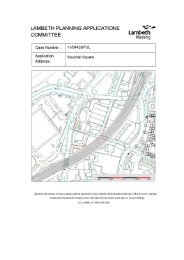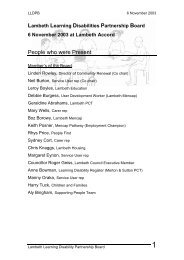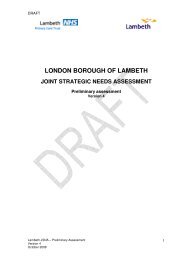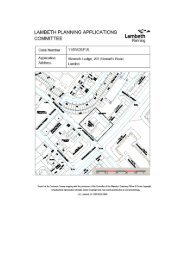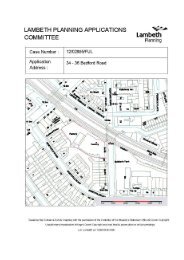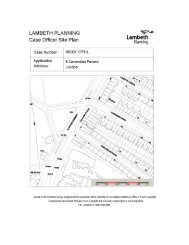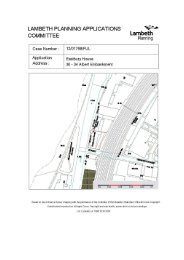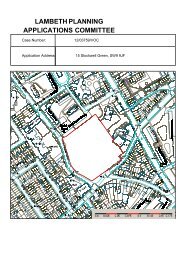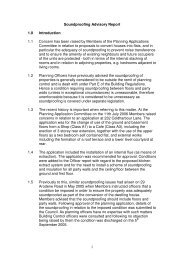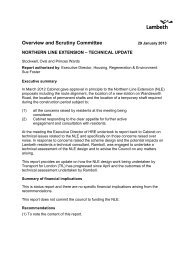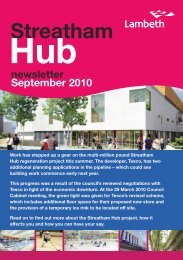London Plan 2011 PDF 1 MB - Lambeth Council
London Plan 2011 PDF 1 MB - Lambeth Council
London Plan 2011 PDF 1 MB - Lambeth Council
Create successful ePaper yourself
Turn your PDF publications into a flip-book with our unique Google optimized e-Paper software.
The <strong>London</strong> <strong>Plan</strong> July <strong>2011</strong> – RTF version<br />
<strong>London</strong>. Policy 6.13 also requires the provision of electrical charging points<br />
in new developments as part of parking provision requirements.<br />
5.45 The Mayor will work with the <strong>London</strong> Hydrogen Partnership, boroughs and<br />
others to support the development of a Hydrogen Action <strong>Plan</strong>, and the<br />
development of energy infrastructure based on hydrogen as a principal<br />
energy carrier. The Mayor will encourage boroughs to identify capacity for<br />
such infrastructure. Advanced conversion technologies for treating waste can<br />
be linked to highly efficient energy generation methods such as gas engines<br />
and hydrogen fuel cells to achieve greater greenhouse gas savings. Through<br />
his chairmanship of the <strong>London</strong> Waste and Recycling Board, the Mayor will<br />
allocate funding to projects supporting the development of advanced<br />
conversion technologies in <strong>London</strong>. The Mayor has also set up a Food to<br />
Fuel Alliance Programme to promote the development of exemplar projects<br />
turning <strong>London</strong>’s food waste into renewable energy including renewable<br />
transport fuel.<br />
Climate Change Adaptation<br />
5.46 All developments should make the fullest contribution to <strong>London</strong>’s<br />
adaptation to climate change and should be designed for the warmer, wetter<br />
winters and hotter, drier summers the city will experience over their lifetime,<br />
and to withstand possible natural hazards (such as heatwaves, flooding and<br />
droughts) that may occur. The following policies are supported by the<br />
<strong>London</strong> Climate Change Adaptation Strategy that contains further proposals<br />
to help <strong>London</strong> adapt to the major impacts of climate change.<br />
POLICY 5.9 OVERHEATING AND COOLING<br />
Strategic<br />
A The Mayor seeks to reduce the impact of the urban heat island effect in<br />
<strong>London</strong> and encourages the design of places and spaces to avoid<br />
overheating and excessive heat generation, and to reduce overheating due<br />
to the impacts of climate change and the urban heat island effect on an<br />
area wide basis.<br />
<strong>Plan</strong>ning decisions<br />
B Major development proposals should reduce potential overheating and<br />
reliance on air conditioning systems and demonstrate this in accordance<br />
with the following cooling hierarchy:<br />
1 minimise internal heat generation through energy efficient design<br />
2 reduce the amount of heat entering a building in summer through<br />
orientation, shading, albedo, fenestration, insulation and green roofs<br />
and walls<br />
3 manage the heat within the building through exposed internal thermal<br />
mass and high ceilings<br />
4 passive ventilation<br />
5 mechanical ventilation<br />
6 active cooling systems (ensuring they are the lowest carbon options).<br />
C Major development proposals should demonstrate how the design,<br />
materials, construction and operation of the development would minimise<br />
Page 144 of 310



